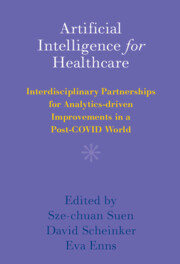 Artificial Intelligence for Healthcare
Artificial Intelligence for Healthcare Book contents
- Artificial Intelligence for Healthcare
- Artificial Intelligence for Healthcare
- Copyright page
- Contents
- Contributors
- Preface
- Introduction
- Part I Personalized Medicine
- Part II Optimizing Healthcare Systems
- 5 Using Algorithmic Solutions to Address Gatekeeper Training Issues for Suicide Prevention on College Campuses
- 6 Optimizing Defibrillator Deployment
- 7 Optimization of Biomarker-Based Prostate Cancer Screening Policies
- 8 Analytics-Driven Capacity Management
- References
8 - Analytics-Driven Capacity Management
Principles and Practical Lessons from Projects at Three Hospitals
from Part II - Optimizing Healthcare Systems
Published online by Cambridge University Press: 21 April 2022
- Artificial Intelligence for Healthcare
- Artificial Intelligence for Healthcare
- Copyright page
- Contents
- Contributors
- Preface
- Introduction
- Part I Personalized Medicine
- Part II Optimizing Healthcare Systems
- 5 Using Algorithmic Solutions to Address Gatekeeper Training Issues for Suicide Prevention on College Campuses
- 6 Optimizing Defibrillator Deployment
- 7 Optimization of Biomarker-Based Prostate Cancer Screening Policies
- 8 Analytics-Driven Capacity Management
- References
Summary
This chapter provides an introduction to analytics-driven hospital capacity management through three projects that employed mathematical programming and discrete event simulation to address common challenges. The first project used mathematical programming to identify the mix of patients at Stanford Hospital that would maximize revenue given the capacity of hospital resources after a planned hospital expansion. The second project used discrete event simulation to plan the physical capacity and operational profile of a new procedural space at a hospital in New England. The third project combined mathematical programming and discrete event simulation to create a tool to schedule surgical procedures at Lucile Packard Children's Hospital Stanford.
Information
- Type
- Chapter
- Information
- Artificial Intelligence for HealthcareInterdisciplinary Partnerships for Analytics-driven Improvements in a Post-COVID World, pp. 159 - 181Publisher: Cambridge University PressPrint publication year: 2022